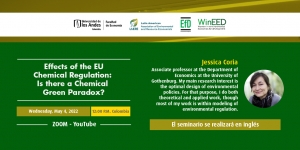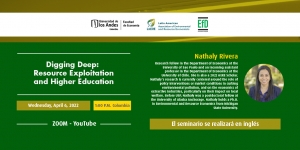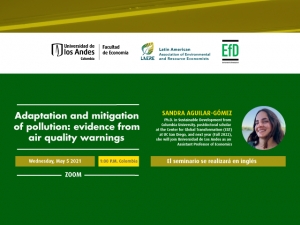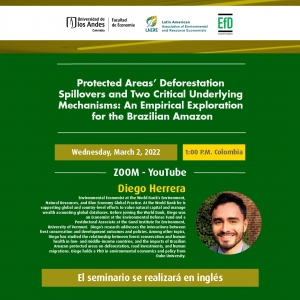Manuela Fonseca
Assessing the use of pseudo-panels to estimate the value of statistical life
Felipe Vasquez-Lavin, Luna Bratti, Sergio Orrego, Manuel Barrientos.
Applied Economics 1-17
From strong leadership to active community engagement: Effective resistance to illegal coca crops in Afro-Colombian collective territories.
Iván D Lobo, María Alejandra Vélez.
International Journal of Drug Policy 10, 103579
Livelihoods Characterization of a Small-Scale Fishing Community in the Colombian Caribbean
Jorge Higinio Maldonado, Rocío del Pilar Moreno-Sánchez, Myriam Elizabeth Vargas-Morales, Emilio Leguízamo.
Marine and Fishery Sciences (MAFIS) 35, 2.
Extracting low-cost signals of perceived quality control in community pharmacies: a simulated client study of contraceptive dispensing in Bogotá
Tatiana Andia, Cesar Mantilla, Álvaro Morales, Santiago Ortiz, Paul Rodríguez-Lesmes.
Lecturas de Economía 96.
LAERE-WinEED_EfD Seminar | Effects of the EU Chemical Regulation: Is there a Chemical Green Paradox?
Zoom
Inscripciones aquí | Register here
Jessica Coria is an associate professor at the Department of Economics at the University of Gothenburg. Her main research interest is the optimal design of environmental policies. For that purpose, she does both theoretical and applied work, though most of her work is within modeling of environmental regulation.
Abstract:
We investigate the effects of the Candidate List of the European chemicals regulation REACH, which gives advanced safety information to downstream users about substances of very high concern posing risks to human health and the environment. The substances included on the Candidate List will progressively be put forward for inclusion on the Authorization List, implying that they cannot be manufactured in or imported into the EU from a sunset date, unless the companies have obtained an authorization for their specific use(s). Our theoretical model shows that the Candidate List affects the consumption of hazardous chemicals through different countervailing channels. On the one hand, disclosure about the hazard properties reduces the demand of the chemicals. On the other hand, stocks might built up to mitigate the risk that the chemical may be unavailable in the future. We test these theoretical predictions using official registry data on the consumption of hazardous chemicals in Sweden. Our findings suggest that reductions in consumption are only observed for chemicals for which the disclosure effect is large.
LAERE-EfD Seminar | Digging Deep: Resource Exploitationand Higher Education
Zoom
Inscripciones aquí | Register here
Nathaly Rivera is a research fellow in the Department of Economics at the University of Sao Paulo and an incoming assistant professor in the Department of Economics at the University of Chile. She is also a 2022 AERE Scholar. Nathaly’s research is currently centered around the role of policy interventions or market conditions in curbing environmental pollution, and on the economics of extractive industries, particularly on their impact on local welfare. Before USP, Nathaly was a postdoctoral fellow at the University of Alaska Anchorage. Nathaly holds a Ph.D. in Environmental and Resource Economics from Michigan State University.
Abstract:
Do resource-extraction booms crowd out investment in postsecondary education? We explore this question by examining higher education-related decisions of the universe of Chilean high school graduates during the 2000s commodities boom. On the one hand, we show that mineral extraction increases the students' likelihood of enrolling in postsecondary technical education. On the other hand, we document a rise in the likelihood of dropping out of college, especially in leaving a four-year professional degree program. Further analysis reveals that students dropping out come primarily from public high schools generally associated with low-income groups. An exploration of different mechanisms suggests that increasing the opportunity cost of higher education in areas with mineral extraction may drive the results. Our findings constitute strong evidence that natural resources may severely affect human capital accumulation in areas with mineral extraction, particularly among low-income groups.
Seminario LAERE-EfD-WinEED: The Evolution and Persistence of Women's Roles: Evidence from the Gold Rush (work in progress con Anja Benshaul-Tolonen (Barnard)).
Sandra Aguilar-Gómez is an incoming postdoctoral scholar at the Center for Global Transformation (CGT) at UC San Diego, and next year (Fall 2022), she will join Universidad de Los Andes as an Assistant Professor of Economics. She holds a Ph.D. in Sustainable Development from Columbia University. Her main research interests focus on understanding the consequences of environmental change and the challenges governments face in implementing policies in contexts with underlying structural inequalities or weak institutions. Likewise, she also conducts research in gender issues for developing countries.
Seminario LAERE-EfD: Protected Areas’ Deforestation Spillovers and Two Critical Underlying Mechanisms: An Empirical Exploration for the Brazilian Amazon
Zoom
Inscripciones aquí | Register here
Diego Herrera is an Environmental Economist at the World Bank’s Environment, Natural Resources, and Blue Economy Global Practice. At the World Bank he is supporting global and country-level efforts to value natural capital and manage wealth accounting global databases. Before joining the World Bank, Diego was an Economist at the Environmental Defense Fund and a Postdoctoral Associate at the Gund Institute for Environment, University of Vermont. Diego’s research addresses the interactions between frest conservation and development outcomes and policies. Among other topics, Diego has studied the relationship between forest conservation and human health in low- and middle-income countries, and the impacts of Brazilian Amazon protected areas on deforestation, road investments, and human migrations. Diego holds a PhD in environmental economics and policy from Duke University.
Sub-national water–food–labour nexus in Colombia.
T. Builes T. Distefano, A. Saldarriaga-Isaza, E. Muñoz.
Journal of Cleaner Production 335, 130138.
Simulating the effect of the Pay-as-you-go scheme for solar energy diffusion in Colombian off-grid regions.
Laura Montoya-Duque, Santiago Arango-Aramburo, Jessica Arias-Gaviria.
Energy 244, part B, 123197.



